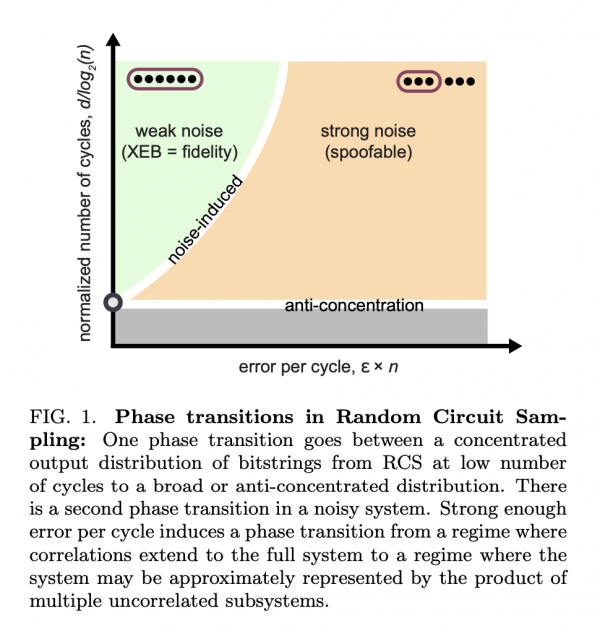A Google-led team of researchers have presented more evidence that it’s possible to run productive circuits on today’s near-term intermediate scale quantum devices that are beyond the reach of classical computing.
“[By] presenting an RCS experiment in the weak noise phase with 67 qubits at 32 cycles, we demonstrate that the computational cost of our experiment is beyond the capabilities of existing classical supercomputers. Our experimental and theoretical work establishes the existence of transitions to a stable computationally complex phase that is reachable with current quantum processors,” write Google and collaborators in the paper published in Nature today. (Boldface added)
Just what we call this capability (boldface) is often disputed. Quantum Supremacy is the most often-used term, but others such as Quantum Utility, championed by IBM, have also gained traction. Quantum Advantage is another common term, but reserved for the ability to perform useful functions better on a quantum than on classical systems. Practicality or usefulness is not part of Quantum Supremacy definition.
Google’s latest paper, published today in Nature, doesn’t claim to demonstrate Quantum Supremacy but does claim to demonstrate that it should be possible to run some functions more efficiently on NISQ era quantum computers than on classical computers.
Here’s Nature description of the work: “The demonstration of a quantum processor capable of performing computational tasks that current supercomputers cannot replicate is published in Nature. The experiment is part of a deeper study into the potential for quantum processors to carry out complex computations despite interference from background noise (disturbances that can affect the accuracy of a quantum computer’s calculations).
“Quantum processors are sensitive to noise — environmental disturbances such as temperature, magnetic fields or even radiation from space — which has the potential to disrupt the performance of complex tasks that are unattainable by classical supercomputers. However, it has been challenging to probe exactly how noise affects the performance of quantum circuits.
“Alexis Morvan and colleagues explore the route by which quantum processors enter the realm of complex computing outputs. They use a method called random circuit sampling to test the fidelity of a 2D grid of superconducting qubits (the building blocks of a quantum computer). Random circuit sampling is a benchmark for evaluating the performance of a quantum computer compared with a classical supercomputer. These experiments reveal a transition between two phases: in the second, so-called “low-noise phase”, the computation is proven to be sufficiently complex for the quantum computer to outperform classical comparisons. Furthermore, they demonstrate beyond-classical performance with a 67-qubit Sycamore chip.”
Google has hinted that the recent work will be part of larger, more layperson-friendly announcement, in November. You may recall the headlines and controversy surrounding Google first claim of Quantum Supremacy back in a 2019 paper (see HPCwire coverage, Google Goes Public with Quantum Supremacy Achievement; IBM Disagrees).
While the race to achieve provable quantum supremacy has continued, the quantum community’s efforts, or at least public announcements of such efforts, have been tempered with more attention being placed on interim steps such as quantum utility and quantum advantage. It’s thought reaching the latter will trigger use of commercial quantum applications. (Broad Google roadmap shown below).
Here’s the full abstract to the recent Google paper (Phase Transitions in Random Circuit Sampling):
Abstract: “Undesired coupling to the surrounding environment destroys long-range correlations on quantum processors and hinders the coherent evolution in the nominally available computational space. This noise is an outstanding challenge to leverage the computation power of near-term quantum processors. It has been shown that benchmarking Random Circuit Sampling (RCS) with Cross-Entropy Benchmarking (XEB) can provide an estimate of the effective size of the Hilbert space coherently available. Nevertheless, quantum algorithms’ outputs can be trivialized by noise, making them susceptible to classical computation spoofing.
“Here, by implementing an RCS algorithm we demonstrate experimentally that there are two phase transitions observable with XEB, which we explain theoretically with a statistical model. The first is a dynamical transition as a function of the number of cycles and is the continuation of the anti-concentration point in the noiseless case. The second is a quantum phase transition controlled by the error per cycle; to identify it analytically and experimentally, we create a weak link model which allows varying the strength of noise versus coherent evolution. Furthermore, by presenting an RCS experiment in the weak noise phase with 67 qubits at 32 cycles, we demonstrate that the computational cost of our experiment is beyond the capabilities of existing classical supercomputers. Our experimental and theoretical work establishes the existence of transitions to a stable computationally complex phase that is reachable with current quantum processors.”
The use of a random circuit sampling (RCS) algorithm is sometimes criticized as being too simplistic an approach and without practical value, but this criticism has diminished in recent years. The Google researchers note in their paper, “RCS is arguably the entry point into the realm of classically intractable problems for any experimental quantum processing platform. The reason is that RCS circuits can be optimized to maximize the speed of quantum correlations with iSWAP-like gates while preventing potential simplifications in the corresponding classical emulations. This intensifying quantum-classical competition motivates two questions: are there well-defined boundaries for the region where the exponentially large Hilbert space is, in fact, leveraged by a noisy quantum processor? More importantly, can we establish an experimental observable that directly probes these boundaries?”
Nature news a nice account of the work. Sergio Boixo, the head of Google’s quantum computing effort in Santa Barbara, California, told Nature, If you cannot win an advantage with RCS, the simplest of applications, “I don’t think you can win in any other application.”
In their closing section, the researchers say, “Looking forward, despite the success of RCS in quantifying the available coherent resources, finding practical applications for near-term noisy quantum processors still remains an outstanding challenge. Certified randomness generation could be a promising candidate for such an application.
The latest Google paper is fairly technical and best read directly.
Link to Nature paper, https://www.nature.com/articles/s41586-024-07998-6
Link to Nature news, https://www.nature.com/articles/d41586-024-03288-3


